Brand hijacking – Open letter to Peter Verhoeven, Managing Director Europe, Middle East, Africa at Booking.com
Dear Peter Verhoeven,
Since the opening of our first prizeotel – the prizeotel Bremen – six years ago, Booking.com has always been a fine business partner. We deliberately decided to build our own hotel brand as we believed into the power of the internet – and still do. Although many warned us and rather seen us as a franchisee of an established hotel brand. However, with a unique product we could not see the added value: Our brand is characterised by each single team member, who achieve consistently a professional and flawless hotel with an authentic, natural and enjoyable atmosphere. Combined with a little bit creativity and the breaking of conventional hotel strategies, prizeotel is a product that writes small and big stories. It is so exciting that many guests happily recommend and like us; mention us on social media networks and much more. All this, what we invest in our product and our teams, pays out through our guests as multipliers. Successful return on investment – materially and non-materially.
We did not count on the sales power of international hotel brands but on the reach that we could achieve with partners such as Booking.com but never as a single hotel. Advertisements for potential guests, who are in the very beginning of the buying circle – the so called search funnel –, are very expensive. The wishes, interests and expectations of these searchers vary widely and often the final decision for the destination has not been made. It is not profitable for single hotels (like our hotels in Bremen and Hamburg) to book general advertisement-keywords such as “hotel Hamburg” on Google or banner advertise on the topic Hamburg due to high divergence losses. At this early stage in the deciding process it depends on too many aspects if a guests ends up travelling to Hamburg and which hotel he will book.
This is where hotel platforms like Booking.com achieve a real benefit for the hotel industry. The high number of hotels, which Booking.com and other hotel booking platforms are able to offer the undecided guests with diverse range of interests in every region, allows Booking.com to approach potential customers in this early stage of the buying circle with advertisement. Due to the variety of hotels it is most likely that the surfer comes across one hotel that he likes. This way Booking.com can turn a potential guest into a real booking. Hotel booking platforms charge well for this service and as a hotel I do not mind to pay it, as it is worth the service. We get guests mediated, which otherwise might never have learned about our hotel. So far it is a win-win-situation for your company, as well as for us as hotel.
As you know, last year I took part in your Circle-event in Amsterdam, to which you invited well-known business partners. The presentations consistently used the words “partner” and “partnership”. My objection that it is not partner-like to bid on Google on our brand ‘prizeotel’ has been constantly disregarded, also from highest level. ‘Corporate phrases’ had been mentioned as explanation, but have not been comprehensible. Exactly this behaviour, repeatedly bidding on our brand, is the reason for this letter, as no one in your company is taking interest in this topic or communication has been interrupted. Maybe I am the only one having this critical opinion; maybe others are not as well informed. However, I think that our partnership needs more respect from the side of Booking.com.
Users searching for our brand, entering “prizeotel Hamburg” into Google, these users are the ones who know us. Maybe they stayed at one of our hotels before or found us through one of our many activities. Searching for “prizeotel Hamburg” means the person does not want to compare hotels in Hamburg, that person specifically wants us. Most likely he wants to stay with us and looks for available dates. Who searches “prizeotel Hamburg” on Google wants to book with us. Prizeotel is our brand, who looks for prizeotel is our (potential) guest. This is “navigational search” and not “informational search”.
But if Booking.com places advertisements for the keyword „prizeotel hamburg“, Booking.com takes us this guest away. I call this “guestnapping”. Instead a direct booking on our website, this guest books through Booking.com. Booking.com forwards this booking to us and charges us nearly 20% commission. Therefore Booking.com first steals our guest through the brand hijacking and sells him back for an expensive price.
Dear Peter Verhoeven,
How would you feel, if a friend steals you 100,-Euro out of your wallet and tells you afterwards. “I have organised 100,-Euro for you, but you only get them if you pay me 20,- Euro of them.” Would you be glad that you just got back 80,- Euro?
And it gets even worse: We do not only have to pay approx. 20% on something that used to be ours. The brand hijacking of Booking.com also increases the prices that we have to pay Google for our own brand!
To explain this, I refer to Google’s auction system, in which focus is on the relevance of search results and paid advertisements. If an advertisement does not suit a search very well, it increases the price per click. If an advertisement does not fit at all, it does not matter how much the advertising customers bids, the advert will not be delivered. On the other hand, the price per clicks decreases if an advertisement is relevant for the searcher. Not Google but the browsing habits of the internet user decide what is relevant: The better an advertisement is clicked on, the higher Google estimates the relevance and therefore the quality of the advertisement.
Exceeds the quality of an advertisement a certain threshold Google rewards the advertisements with the possible combination of “advertisement extensions”. One of the best advertisement extension that can be achieved are the “Sitelinks” with own texts. Usually these can only be with brand-name keywords (see following picture 1)
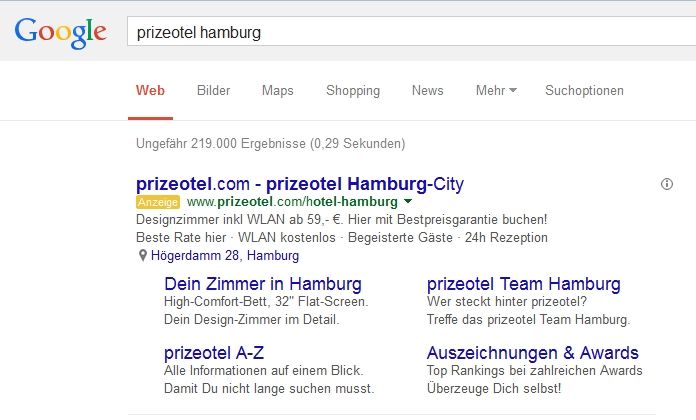
Due to its enormous variety of brands Booking.com achieves very high relevance on Google. Eventually worldwide users click on a great spectrum of Booking.com-advertisements – and it is growing daily. If Booking.com bids on the brand names of smaller hotels such as prizeotel with its market power – and basically even an international hotel chain is small compared to the volume of Booking.com – it leads to relatively low costs per click due to Google’s system of relevance. Many surfers will click on the advert: Maybe because they know Booking.com very well and like the platform. Maybe, because they do not look properly and do not know that they will not be forwarded directly to the hotel’s website, but to an intermediate.
Brand owners can lodge an application for trademark protection. As a result Google will block the utilisation of the protected brand with the texts of advertisements. But it is not an effective protection against brand hijacking, as with a little bit creativity it is easy to bypass this blockage of a brand. For example with a deliberately incorrect spelling of the brand-name (see picture 2, “Prize Otel”)

Or its utilisation in the URL of an advertisement (see picture 3)
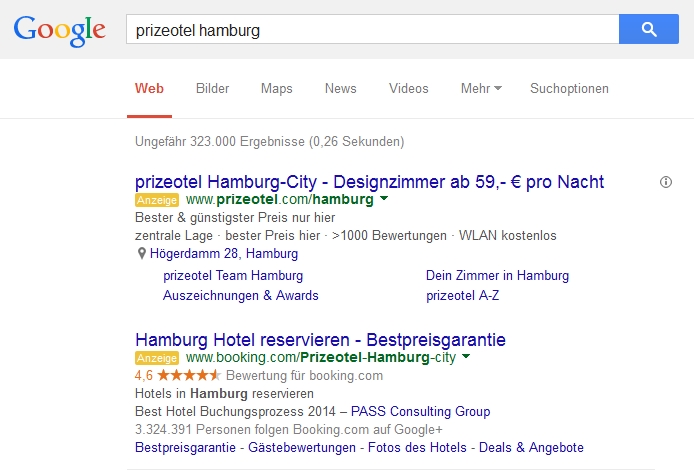
Instead of only one advert on the search of „prizeotel hamburg“, two will appear due to Booking.com’s brand hijacking. Of course the clicks are divided between the advertisements. Because of the lower number of clicks on our advert not all Sitelinks are displayed anymore, but only a shortened version (see picture 4).
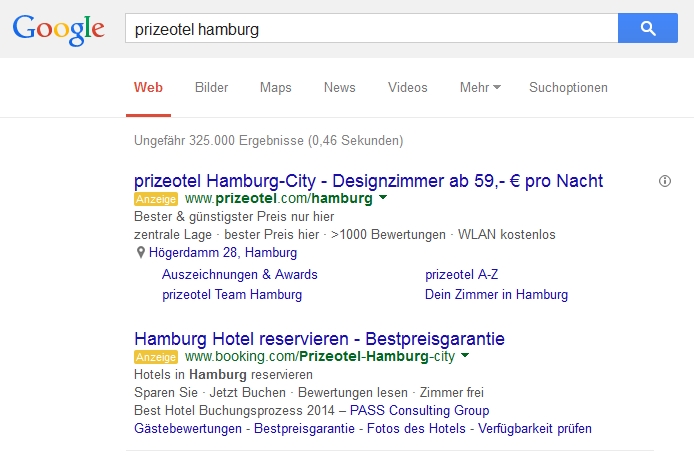
Or even none (see picture 5).
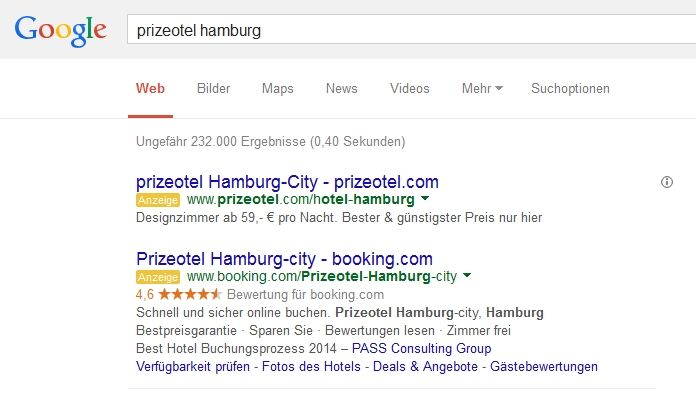
In consequence to the smaller size of our advertisement we receive fewer clicks. The relevance decreases. The costs per clicks increase. In January 2015 we consistently dropped off with our Google advert ranking for the brand advertisements for Hamburg, which strongly affected our costs. Dropping in the advert ranking means, that Booking.com’s advertisement is often displayed on a higher position than our advert. This again led to an even lower click rate and therefore increased our click price.
Two comparisons make it obvious:
A) Average costs per click (CPC) in January 2015 (Match type “exact”). In Bremen, currently without brand hijacking by other companies, in Hamburg with brand hijacking by Booking.com
[prizeotel bremen] CPC 0.07 Euro
[prizeotel hamburg] CPC 0.73 Euro
This might sound not very much, but these are our most important and most treasured keywords. Brand hijacking does not make it “a little bit more expensive”, the costs increased tenfold.
B) Maybe Hamburg is more expensive in AdWords than Bremen? Let’s compare February 2014 (directly after the start of the AdWords for our hotel in Hamburg) with January 2015 (after one year price pressure of brand hijacking)
[prizeotel hamburg] (February 2014) CPC 0.04 Euro
[prizeotel hamburg] (January 2015) CPC 0.73 Euro
No, Hamburg is not more expensive in AdWords. What is more expensive is one year competing brand hijacking through Booking.com. Thus we pay 18 times !!!! (in words: eighteen) more per click on our brand than directly before and even shortly after our opening.
To point out the explosiveness again: search terms on a brand are not only inexpensive for the brand owner due to the high relevance in the Google AdWords auction system, but also mean a very high likeliness that a searcher turns into a booker. With the booking of an own brand as search term on Google AdWords the brand owner basically earns what he invested into his brand.
Therefore Booking.com not only takes our customers away but to sell them back to us, Booking.com poaches our most treasured Google-searcher, those ones that know our brand through a long, extensive, creative and successful brand development.
Brand hijacking in the current extent is not a trivial offence and more than just a punch in the face. Brand hijacking through a hotel platform takes a brand and the teams, as well as every single team member, the reward for his work. We feel fooled for the fruits of our efforts in three ways:
- Another company profits from our hard developed brand.
- Our own customer is taken away and sold back expensive.
- For the remaining customers we have to pay Google significantly more.
Dear Peter Verhoeven,
Among all phrase mongering of the type „corporate bullshit“, that might be as an answer on the tip of your tongue, this practice is not a mistake but on purpose by Booking.com.
Google AdWords offers many different reports for an AdWords analysis, for example the report on the auctions. This shows which other AdWord-customers bid on the same keyword than yourself. Due to the keyword match types of the AdWord auction system it might come to some unwanted over-lapses from time to time. However, the numbers usually visualise if someone bids on the same keyword by purpose or by accident. Picture 6 for example – it shows the report on the auction data for the keyword [prizeotel hamburg] in January 2015 – visualises the rather mistakenly over-lapse by TripAdvisor and the very certain booking on the brand by purpose of Booking.com
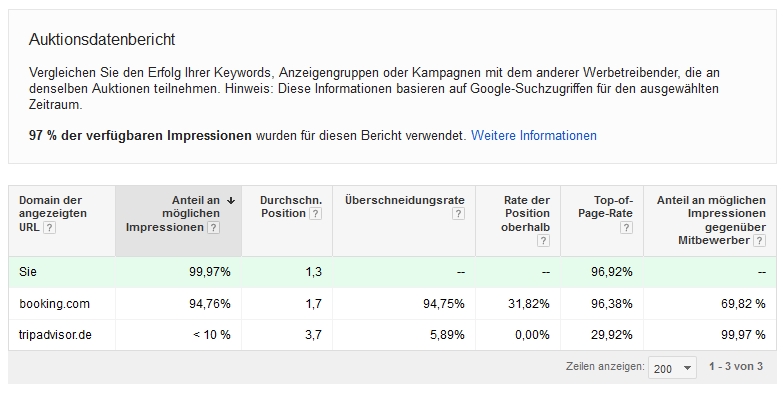
It is very easy to protect from the unwanted appearance of advertisements on Google Adwords: you simply book the keywords on which an advertisement shall explicitly not be displayed as negative keyword.
Please do not misunderstand me: Booking.com contributed its part to the development of the brand prizeotel and I do not ask the height of the provision, when, yes when Booking.com complies with fair rules.
Dear Peter Verhoeven,
Maybe the upcoming ITB is a good moment to demonstrate partner-like behaviour by Booking.com: Walk the talk and book the brand names of your partner hotels principally as negative keywords. Demand the same from your many thousand Affiliate-partners contractual. This will prevent disloyal brand hijacking – not on purpose and not by mistake!
I am looking forward, to hear back from you and to continue the good business partnership on a level playfield.
Kind regards,
Your
Marco Nussbaum



Sehr schöner Artikel!
Ich kenne beide Seiten, stelle mich auf Ihre und möchte noch hinzufügen, dass es Booking.com nicht möglich wäre auf Dauer das gesamte Spektrum an Keywords abzudecken ohne Brandhijacking zu betreiben. Für OTA´s ergeibt sich für generische Begriff, wie „Hotel Hamburg“ eine im Verhältnis ähnlich niedrige Konversionsrate, wie auch für Hotelwebseiten. „Aufgefangen“ wird das ganze dann durch deutlich profitablere Keywords, wie z.B. Marken- und Hotelnamen. Gerechtfertigt wird das gerne mit der Aussage, dass man in die selbe Person ja vorher schon investiert hat. Wir wissen, dass die selbe Person vor 2 Wochen auf unsere Anzeige für „Hotel in Hamburg“ geklickt, diese wollen wir auf keinen Fall verlieren.
Das sehe ich als Chance für Hotels. Eine gut ausgesteuerter Adwords Account mit verschiedenen Kampagnentypen, einem Mix aus Such, Display und Remarketing Anzeigen, kann durchaus profitabel sein, auch wenn er die Unerschlossenen über „Hotels in Hamburg“ bewirbt. Der ROI sollte ebenfalls diffeenzierter betrachtet werden, denn ein Gast, der über die Webseite des Hotels bucht, wird in vielen Fällen auch in den nächsten Jahren für Umsatz sorgen.
Dear Marco,
Thank you for publishing this letter. I run a small holiday complex in Broome, Western Australia, and I totally agree with you.
Booking.com started off as a welcome partner, opening up markets that we did not have access to (such as Europe) as we could not afford to advertise on keywords such as Broome Accommodation.
In the last 1 to 2 years, our direct bookings have decreased in an inverse relationship to the increase in bookings from Booking.com and other OTAs who have taken it on themselves to hijack our brand.
I do not believe that you will ever get these businesses to change their model, as this is too profitable for them. For a small outlay (cents per click) they almost guarantee a booking, whereas it costs me several dollars per click to advertise on my own business name and we do not guarantee a booking.
I believe that we need legislation in each country to ensure that we do not allow companies to hijack our brands like this – with serious penalties for breaches. Even enforcing rules on Google and other search engines to ensure that they do not allow booking.com to continue doing this.
Unfortunately, in Australia, many of the big hotel chains (such as Hilton) do not care. They are used to paying large commissions (up to 35%) to travel agents and wholsalers, so see this move to paying booking.com 12 to 25% as just a move from one channel to another. Also, these businesses are the ones that the government will listen to, rather than small businesses like us who are more affected by this sort of increase in our costs.
I would love to know if you got a reply from Booking.com.
Regards,
Ross
Great article, was there actually ever any response from booking.com?
Regards,
Nico